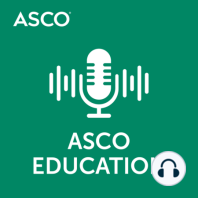5 min listen
ASCO Guidelines: Safe Handling of Hazardous Drugs
FromASCO Education
ratings:
Length:
10 minutes
Released:
Apr 24, 2019
Format:
Podcast episode
Description
An interview with Dr. Paul Celano from the greater Baltimore Medical Center, lead author on "Safe Handling of Hazardous Drugs: ASCO Standards." TRANSCRIPT The purpose of this podcast is to educate and to inform. This is not a substitute for professional medical care and is not intended for use in the diagnosis or treatment of individual conditions. Guests on this podcast express their own opinions, experience, and conclusions. The mention of any product, service, organization, activity, or therapy should not be construed as an ASCO endorsement. Hello and welcome to the ASCO Guidelines podcast series. My name is Shannon McKernin. And today I'm interviewing Dr. Paul Celano from the greater Baltimore Medical Center, lead author on "Safe Handling of Hazardous Drugs: ASCO Standards." Thank you for being here today, Dr. Celano. Thank you for having me. I'm certainly glad to talk about these standards. They're very important to our employees and our patients. So first I want to make the distinction that this publication is not a guideline like we usually cover on this podcast. So can you tell us what standards are and how they differ from guidelines? Well, guidelines really are intended to guide practitioners around recommended care options. They give obviously a lot of latitude to clinical judgment and circumstances. Standards, on the other hand, are really meant primarily for the organization of care and are intended to have a higher level of obligation to help drive either practice or policy or even legislative efforts. So that's really the distinction. And what are the standard statements that are made by ASCO in this publication? The publication really is about safe handling of hazardous drugs. This all came about is because recently there have been a number of national guidelines or standards that have been offered by other organizations, but not specifically oncology or certainly ASCO or the ASCO organization. We felt a need to address the standards that have been put out on the basis of the evidence, so that best practices can be offered. Initially, we did collaborate with other societies, such as the Oncology Nursing Society and the Hematology Oncology Pharmacy Association. That was really the impetus behind making sure that we are, in a sense, congruent with standards that are already being published and discussed, but also to also place in our interpretation of these standards so that they're based on the best evidence that's available. And what qualifying statements are there to note about these standards? Well, I think the best way to look at these standards is there has been recently published or offered what's been called the UST 800 standards, which really incorporate other previous standards by the Pharmacy Association as well as OSHA, the Occupational Safety and Health Association, as well as NIOSH, the American Society of Hospital Pharmacists, Oncology Nursing, etc. So there's a lot of standards that have been offered. And in fact, the ASCO review of this really in a sense agrees with many of the standards that have already been published and offered-- types of exposures, the responsibilities of personnel handling the drugs, the personal protective equipment, how we communicate the hazardous drugs, the training of compounding personnel, how the drugs are dispensed and even transported. So there's lots of things that we really do agree with. I think it's also important to understand that the objectives of this is really to protect personnel and the environment to make sure the standards apply to all personnel who compound hazardous drugs and preparations, all places where hazardous drugs are prepared and stored, transported and administered. So that's really a key part of this. These are a comprehensive program really to prevent worker environmental exposure and to provide the most practical safety environment for all involved. So finally, why are these standards so important? And how will they affect practice? Well
Released:
Apr 24, 2019
Format:
Podcast episode
Titles in the series (100)
ASCO Guidelines: Pancreatic Cancer: ASCO Guidelines: Pancreatic Cancer by ASCO Education
